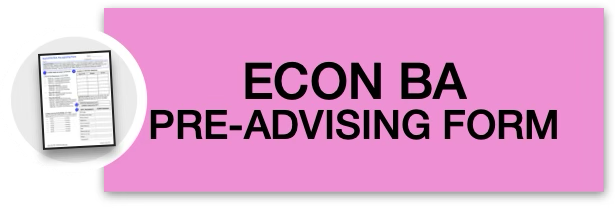Program Requirements (pdf)
Please note: The online course catalog contains the official listing of program requirements, and takes precedence over information listed on this site. Should you discover a discrepancy between the online catalog and any information posted here, please contact the department for instructions.
The Bachelor of Arts (B.A.) degree in Economics consists of at least 43 credits distributed as described below. A grade of “C” or better is required in each course to fulfill major requirements. Students must take a minimum of 21 credits from UMBC (not transferred) ECON courses. Students may complete a maximum of one major or minor from Economics.
A. General Core (22 credits***)
- ECON 101 – Principles of Microeconomics
- ECON 102 – Principles of Macroeconomics
- ECON 311 – Intermediate Microeconomic Analysis
- ECON 312 – Intermediate Macroeconomic Analysis
- Core: Economics. Students must complete one of the following courses. Additional classes taken from this area will count as Upper Level Econ Electives.
- ECON 320 – Elements of Quantitative Methods for Management
- ECON 421 Econometrics
- ECON 423 Economic Forecasting
- ECON 320 – Quantitative Methods for Management OR ECON 421 – Introduction to Econometrics OR ECON 423 – Time Series and Forecasting ***
- Any one of these classes must apply to the “Core: Economics Choose One” area.
- MATH 151 – Calculus and Analytic Geometry I OR MATH 155 – Elementary Calculus I
- ECON 310 – Data Analysis for Economics OR STAT 350 – Statistics with Applications in the Biological Sciences OR STAT 351 – Applied Statistics for Business and Economics OR STAT 355 – Introduction to Probability and Statistics for Scientists and Engineers OR STAT 453 – Introduction to Mathematical Statistics OR CMPE 320 – Probability, Statistics, and Random Processes
*** The requirement that students take one of ECON 320, 421, or 423 applies to students who declared the ECON B.A. major after Summer 2018. Students who declared the major in Summer 2018 or earlier are not required to take one of those courses.
B. Upper Level Electives: (21 additional credits in economics, numbered ECON 314 or higher)
Econ 600 may not be used to fulfill major requirements.
No course in which a student has earned a grade below “C” shall fulfill the major requirements.
For a suggested route through the major, check out UMBC’s Academic Pathways
Emphasis within the Economics Major
There are a number of different emphases that an economics major may want to pursue, depending on educational and career objectives. The recommendations below are a general guide.
1. Students completing a liberal arts program or preparing for professional school should select courses according to their specific interests and should develop a program in consultation with their major advisor.
2. Students preparing for graduate study in economics, particularly at the Ph.D. level, should complete courses that provide the necessary mathematical background. These courses would include:
- ECON 490 – Analytic Methods in Economics
- ECON 421 – Introduction to Econometrics
- MATH 221 – Introduction to Linear Algebra
- MATH 225 – Introduction to Differential Equations
- MATH 251 – Multivariable Calculus
- STAT 453 – Introduction to Mathematical Statistics
3. Students interested in pursuing a career in business should consider completing the requirements for a certificate in Administrative Sciences in addition to completing the requirements for the major.
Career and Academic Paths
A major in economics is excellent preparation for employment in business or government, for professional study in law, business management, urban planning or public administration, or for graduate study in economics.
Graduates of the UMBC economics programs:
- Enter the business world – many of our graduates become certified public accountants.
- Enter government service – employed as economists in local, state, or federal government.
- Attend business school – students get an MBA and enter middle management.
- Obtain an M.A. or Ph.D. in economics – these students will teach and conduct research at the college level or enter research-oriented positions in government or business.
- Attend law school – a B.A. in economics is excellent preparation for a career in law.
